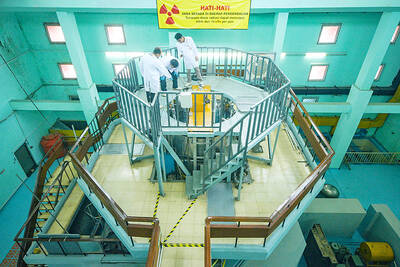A left-wing opposition party held a large advantage in the race for mayor of Colombia's capital entering yesterday's election after violence-marred regional campaigns across the nation.
While conservative President Alvaro Uribe remains widely popular, polls indicate that the party he defeated for the presidency last year may take the second most important elective post in the country -- Bogota mayor.
Samuel Moreno, grandson of a military dictator, held a lead of 40 to 22 percent over independent former Mayor Enrique Penalosa, according to a poll published Saturday by the newspaper El Tiempo. The survey by the Datexco company had a margin of error of 2.7 percentage points.
Moreno's Alternative Democratic Pole already governs Bogota, but consecutive victories would be a boost for his party ahead of the 2010 presidential race. With nearly 7 million people, the capital is home to a sixth of Colombia's population.
Moreno has seemed to shrug off controversies -- notably a pro-Moreno article posted on a Web site favorable to Colombia's leftist guerrilla movements, and his statement in a debate that he would buy 50 votes if he knew his rival had purchased 50,000.
On Friday, Uribe issued an appeal for voters to reject Moreno, saying, "Don't make a mistake in electing mayors supported by the guerrillas who also buy votes."
At stake Sunday are 32 governorships, 1,098 mayorships and thousands of lesser offices.
In an effort to contain violence, the government has restricted the carrying of arms and banned the sale of alcohol until this morning.

Four people jailed in the landmark Hong Kong national security trial of "47 democrats" accused of conspiracy to commit subversion were freed today after more than four years behind bars, the second group to be released in a month. Among those freed was long-time political and LGBTQ activist Jimmy Sham (岑子杰), who also led one of Hong Kong’s largest pro-democracy groups, the Civil Human Rights Front, which disbanded in 2021. "Let me spend some time with my family," Sham said after arriving at his home in the Kowloon district of Jordan. "I don’t know how to plan ahead because, to me, it feels

Poland is set to hold a presidential runoff election today between two candidates offering starkly different visions for the country’s future. The winner would succeed Polish President Andrzej Duda, a conservative who is finishing his second and final term. The outcome would determine whether Poland embraces a nationalist populist trajectory or pivots more fully toward liberal, pro-European policies. An exit poll by Ipsos would be released when polls close today at 9pm local time, with a margin of error of plus or minus 2 percentage points. Final results are expected tomorrow. Whoever wins can be expected to either help or hinder the

North Korea has detained another official over last week’s failed launch of a warship, which damaged the naval destroyer, state media reported yesterday. Pyongyang announced “a serious accident” at Wednesday last week’s launch ceremony, which crushed sections of the bottom of the new destroyer. North Korean leader Kim Jong-un called the mishap a “criminal act caused by absolute carelessness.” Ri Hyong-son, vice department director of the Munitions Industry Department of the Party Central Committee, was summoned and detained on Sunday, the Korean Central News Agency (KCNA) reported. He was “greatly responsible for the occurrence of the serious accident,” it said. Ri is the fourth person

SKEPTICAL: Given the challenges, which include waste disposal and potential domestic opposition, experts warn that the 2032 nuclear timeline is overambitious Indonesia is hoping going nuclear can help it meet soaring energy demand while taming emissions, but faces serious challenges to its goal of a first small modular reactor by 2032. Its first experiment with nuclear energy dates to February 1965, when then-Indonesian president Sukarno inaugurated a test reactor. Sixty years later, Southeast Asia’s largest economy has three research reactors, but no nuclear power plants for electricity. Abundant reserves of polluting coal have so far met the enormous archipelago’s energy needs, but “nuclear will be necessary to constrain the rise of and eventually reduce emissions,” said Philip Andrews-Speed, a senior research fellow at the